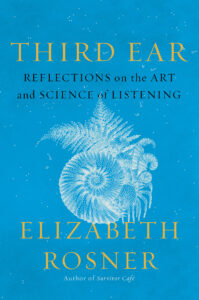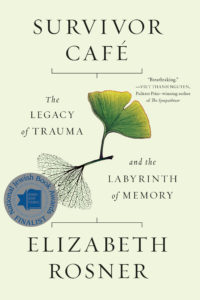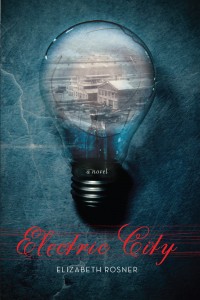Elizabeth Rosner
ELIZABETH ROSNER is a bestselling novelist, poet, and essayist. Her works include Survivor Café: The Legacy of Trauma and the Labyrinth of Memory, a finalist for the National Jewish Book Award, and the novel Electric City, named a best book by NPR. Rosner's essays have appeared in The New York Times Magazine, Elle, and numerous anthologies. She lives in Berkeley, California.
Subscribe to our newsletter for news & events from Counterpoint Press.
Books
Third Ear
Reflections on the Art and Science of Listening
This illuminating book weaves personal stories of a multilingual upbringing with the latest scientific breakthroughs in interspecies communication to show how the skill of deep listening enhances our curiosity and empathy toward the world around usThird Ear braids together personal narrative with scholarly inquiry to examine the power of listening to build interpersonal empathy and social transformation. A daughter of Holocaust survivors, Rosner shares stories from growing up in a home where six languages were spoken to interrogate how psychotherapy, neurolinguistics, and creativity can illuminate the complex ways we are impacted by the sounds and silences of others.
Drawing on expertise from journalists, podcasters, performers, translators, acoustic biologists, spiritual leaders, composers, and educators, this hybrid text moves fluidly along a spectrum from molecular to global to reveal how third-ear listening can be a collective means for increased understanding and connection to the natural world.
Survivor Café
The Legacy of Trauma and the Labyrinth of Memory
A San Francisco Chronicle Best Book of the YearAn “impressive, highly readable” exploration of “atrocity, trauma, and memory” that examines the legacies of the Holocaust, Hiroshima, and other mass trauma events—“a powerful book” (Viet Thanh Nguyen, Pulitzer Prize–winning author of The Sympathizer).
As firsthand survivors of many of the 20th century’s most monumental events—the Holocaust, Hiroshima, the Killing Fields—begin to pass away, Survivor Café addresses urgent questions: How do we carry those stories forward? How do we collectively ensure that the horrors of the past are not forgotten?
Elizabeth Rosner organizes her book around three trips with her father to Buchenwald concentration camp—in 1983, in 1995, and in 2015—each journey an experience in which personal history confronts both commemoration and memorialization. She explores the echoes of similar legacies among descendants of African American slaves, descendants of Cambodian survivors of the Killing Fields, descendants of survivors of the bombing of Hiroshima and Nagasaki, and the effects of 9/11 on the general population. Examining current brain research, Rosner depicts the efforts to understand the intergenerational inheritance of trauma, as well as the intricacies of remembrance in the aftermath of atrocity. Survivor Café becomes a lens for numerous constructs of memory—from museums and commemorative sites to national reconciliation projects to small–group cross–cultural encounters.
Beyond preserving the firsthand testimonies of participants and witnesses, individuals and societies must continually take responsibility for learning the painful lessons of the past in order to offer hope for the future. Survivor Café offers a clear–eyed sense of the enormity of our 21st-century-human inheritance—not only among direct descendants of the Holocaust but also in the shape of our collective responsibility to learn from tragedy, and to keep the ever–changing conversations alive between the past and the present.
“Each page is imbued with urgency, with sincerity, with heartache, with heart . . . [Rosner’s] words, alongside the words of other survivors of atrocity and their descendants across the globe, can help us build a more humane world.”
—San Francisco Chronicle
Electric City
A Novel
Upstate New York, at the confluence of the great Hudson River and its mighty tributary the Mohawk —from this stunning landscape came the creation of a new world of science. In 1887, Thomas Edison moved his Edison Machine Works here and in 1892, it became the headquarters of a major manufacturing company, giving the town its nickname: Electric City.The peak of Autumn, 1919: The pull of scientific discovery brings Charles Proteus Steimetz, a brilliant mathematician and recent arrival from Ellis Island, to town. His ability to capture lightning in a bottle earns him the title "Wizard of Electric City." Barely four feet tall with a deeply curving spine, Steinmetz's physical deformity belies his great intellect. Allied with his Mohawk friend Joseph Longboat and his adopted eleven–year–old granddaughter Midget, the advancements he makes in Electric City will, quite simply, change the world.
The peak of Autumn, 1965: Sophie Levine, the daughter of a company man, one of the many scientists working at The Company, whose electric logo can be seen from everywhere in town. Her family escaped Europe just before World War II, leaving behind a wake of annihilation and persecution. Ensconced in Electric City, Sophie is coming of age just as the town is gasping its last breaths. The town, and America as a whole, is on the cusp of great instability: blackouts, social unrest over Vietnam, and soon the advent of the seventies. Into her orbit drifts Henry Van Curler, the favored son of one of Electric City's founding Dutch families, as well as Martin Longboat, grandson of Joseph Longboat. This new generation of Electric City will face both the history of their town and their own uncertain future, struggling to bridge the gap between the old world and the new.
Electric City is a vital, pulsing, epic novel of America, of its great scientific ingenuity and its emotional ambition; one that frames the birth and evolution of its towns against the struggles of its indigenous tribes, the immigrant experience, a country divided, and the technological advancements that ushered in the modern world.

Catapult | Counterpoint | Soft Skull
1140 Broadway #706
New York, NY 10001
646.926.0805 | info@counterpointpress.com







